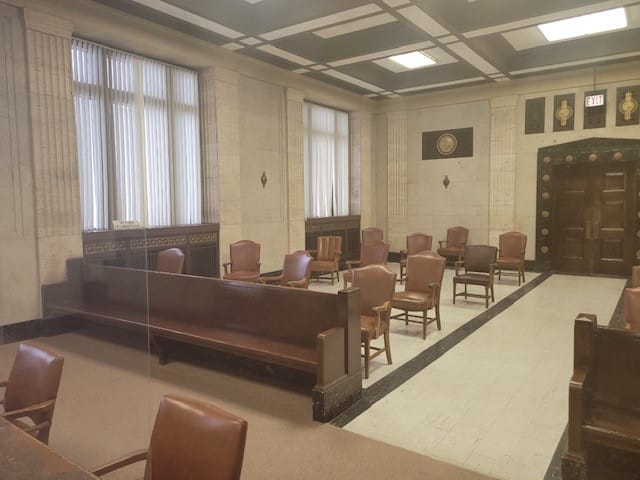The prosecutor in the Dashonn Maggette case on Monday, April 8, told a Cook County judge that a sealed ballistics test report years ago was never entered as evidence, before a jury convicted the man on several felony charges that could put him in prison for life.
That statement was made by Cook County Prosecutor Michelle Spizzirri during a hearing on Monday, April 8, before Cook County Judge Nicholas Kantas. He heard opposing arguments in response to the Chicago Crusader’s petition to unseal a ballistics test report that’s been kept from the media and the public after the document was sealed in the months after Maggette was involved in a scuffle with police in an apartment building in Chatham in 2017.
It was the final hearing held before Judge Kantas, who will rule whether to unseal several documents in the case, where two police officers say Maggette had a gun and tried to kill them before he was arrested and convicted last year of being an armed habitual criminal and of aggravated battery with a firearm.
But the sealed ballistics test report is said to have ruled out that Maggette had a gun during the fight with Officers Patrick Forbes and Michael Hudson.
Maggette’s relatives believe the officers planted the gun on Maggette to frame him to put him behind bars. No hearings were made or transcripts were found when the ballistics test report was filed on August 1, 2017. No explanation or reason was given on the one-page document where the signature believed to be that of Judge Lawrence Flood was redacted. He retired after the Crusader began reporting on the case.
Last year, after Flood retired and Judge Kantas took over the case, the Crusader filed a petition seeking to unseal the ballistics report, which remained sealed during the trial that a jury foreman called a coverup.
Spizzirri, who was one of two prosecutors who helped convict Maggette, was back in the courtroom at the Leighton Criminal Courthouse, where she gave her response to the Crusader’s request to unseal the ballistics test report. At one point during her argument, Judge Kantas asked her was the ballistics test report entered into evidence. Spizzirri said no. In response to the motion to unseal the ballistics test report, Spizzirri said the document should remain “unavailable to the public,” because there are criminal counts her office plans to retry Maggette on after a jury failed to convict him on three felony indictments.
Spizzirri told Judge Kantas she objected to descriptions that the sealed documents were described as being “hidden” (the Crusader in its reporting always described the report as being sealed).
“Nothing in this case has been hidden,” Spizzirri said during the hearing. “There are never instances that I’m aware of, where we’re trying to determine what should be available to the public.”
Despite arguing that she didn’t want the unsealed report made available to the public, Spizzirri later told Judge Kantas, “I don’t have a position on a motion to intervene.
“My issue is with some particular documents he’s (Crusader Attorney Charles Snowden) trying to get to. I think it’s inappropriate.”
Spizzirri suggested that Snowden and the public can obtain data from COPA and the Illinois State Police during the discovery phase and trial where ballistics experts can testify and give information instead of providing the report.
In response to Spizzirri’s argument, Snowden said, “It’s better to have a report than an expert witness. News organizations do that all the time. They examine it and judge for themselves what the facts tell them. You just can’t say something is in discovery and it’s available to the public at large.
During Maggette’s trial last June, Michael Matthews, a forensic scientist employed at the Illinois State Police’s Science Center in Chicago, gave testimony that shed light on DNA that was found on the gun that police said Maggette had. Though DNA from the three individuals were on the 9 mm gun, Matthews did not speak about the details from the ballistics gun report.
“It’s the public’s right to know what the Chicago Police Department is doing,” Snowden said. “The Maggette case is extremely important to the Black community because of years of police brutality and the state has turned a blind eye to that.
Snowden also argued that before Judge Flood sealed the ballistics test report, “It should be done in open court with the defendant and for counsel to be given the opportunity to respond. Court proceedings are open proceedings.”
Snowden called the court order to seal the document, “overly broad.”
“That’s the broadest order I ever seen. It’s overly broad with no justification.”
Maggette’s Public Defender, Karin Talwar, agreed.
“Generally, we are in favor of the affirmative of this document being available to the public,” she said. “I am concerned that the order was broad and the court had been unable to preview it, and there was no previous court hearing where this took place. It might be a due process issue. Maggette should have been present, so that does concern us.”
-
Erick Johnsonhttps://chicagocrusader.com/author/erick-johnson/
-
Erick Johnsonhttps://chicagocrusader.com/author/erick-johnson/
-
Erick Johnsonhttps://chicagocrusader.com/author/erick-johnson/
-
Erick Johnsonhttps://chicagocrusader.com/author/erick-johnson/






